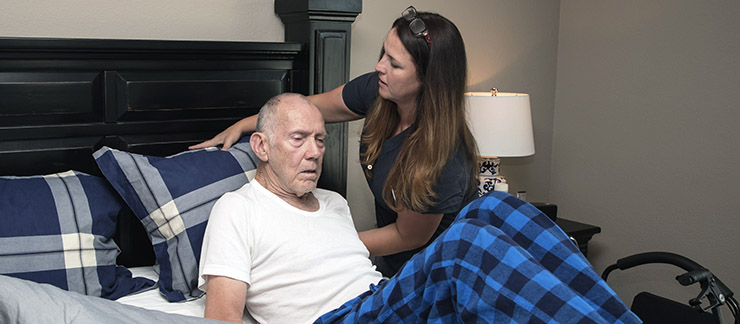
3 Tips for Seniors and Family Caregivers to Get Better Sleep
There’s nothing like a good night’s sleep to help you feel energized, focused, and refreshed. However, when you are caring for a senior loved one, quality sleep can be elusive—for both of you.
A lack of quality sleep may make you both feel sluggish, distracted, anxious, sad, or irritable. Sleep deprivation can affect your immune system and can increase the risk of complications related to chronic illnesses such as diabetes and heart disease.
Optimizing a sleep routine is key and starts with the following fundamentals:
- Avoid long daytime naps when you can
- Go to bed and rise on the same schedule daily, when possible
- Shut off the TV and other devices an hour before bed and do a quiet activity, like reading a book or working on a puzzle
- Start bathing, brushing teeth, and putting on pajamas at a set time of night
What Are Strategies to Help Seniors Get Better Sleep?
Beyond the basics, you need to create a safe and comfortable sleep environment. Here are three effective strategies Visiting Angels caregivers recommend to help get better ZZZs:
Make Clear Paths in the Bedroom
Keep laundry and other items out of walkways. Remove hoses and cords—for device chargers, lamps, or CPAP, oxygen, or IV tubing—from the floor.
Keep pets in a crate to avoid tripping and slippery pet messes. A Visiting Angels caregiver can help keep pathways clear of hazards by putting away personal care items after helping your senior.
Related reading: Fall Prevention Strategies and Tips for Aging Seniors
- Balance Sound, Light, and Warmth
Ambient noise in the room can help induce sleep. Try a radio or white noise machine for soft sound without visual stimulation.
During the day, spend time outdoors to realign the body’s built-in sleep and wake cycle. This also helps relieve symptoms of sundowning—agitation that is associated with Alzheimer’s disease and happens in the afternoon or early evening. At bedtime, use blackout curtains to darken the room, but keep nightlights on to illuminate paths to the bathroom and bedroom door.
Choose warmer pajamas instead of extra blankets that can be kicked off in the night and become a tripping hazard. Some like to sleep with a fan on—talk with a doctor about whether this is OK due to dry eye or other health conditions.
Related reading: Natural Sleep Remedies for Seniors
- Be Mindful About Beverages
Hydration is important, but getting up for a glass of water at night can result in spills and falls. Set a water bottle with an easily accessible spout—not an open glass or cup—on a bedside table for nighttime sipping.
Getting up frequently to use the restroom at night introduces more opportunities to fall. Avoid drinking within an hour of bedtime to reduce nocturnal bathroom trips. See a doctor if this doesn’t help, because going often at night can be a sign of a bladder, kidney, or prostate condition.
Limit caffeine throughout the day. A few cups of coffee a day is fine for most seniors, but having more than four can increase anxiety and blood pressure and interfere with sleep. Talk with a doctor about a safe amount of caffeine for your loved one.
Visiting Angels Can Help Seniors Get Restful Sleep
Ensuring your senior enjoys a restful and rejuvenating sleep can greatly enhance their overall well-being. If your loved one needs in-home personalized assistance to improve sleep quality and overall senior care, look no further than Visiting Angels. Our dedicated team is committed to providing compassionate and tailored support to bring comfort, peace, and safety to those who matter most.
Take the first step toward a more restful night’s sleep for your senior and you – contact Visiting Angels today.
